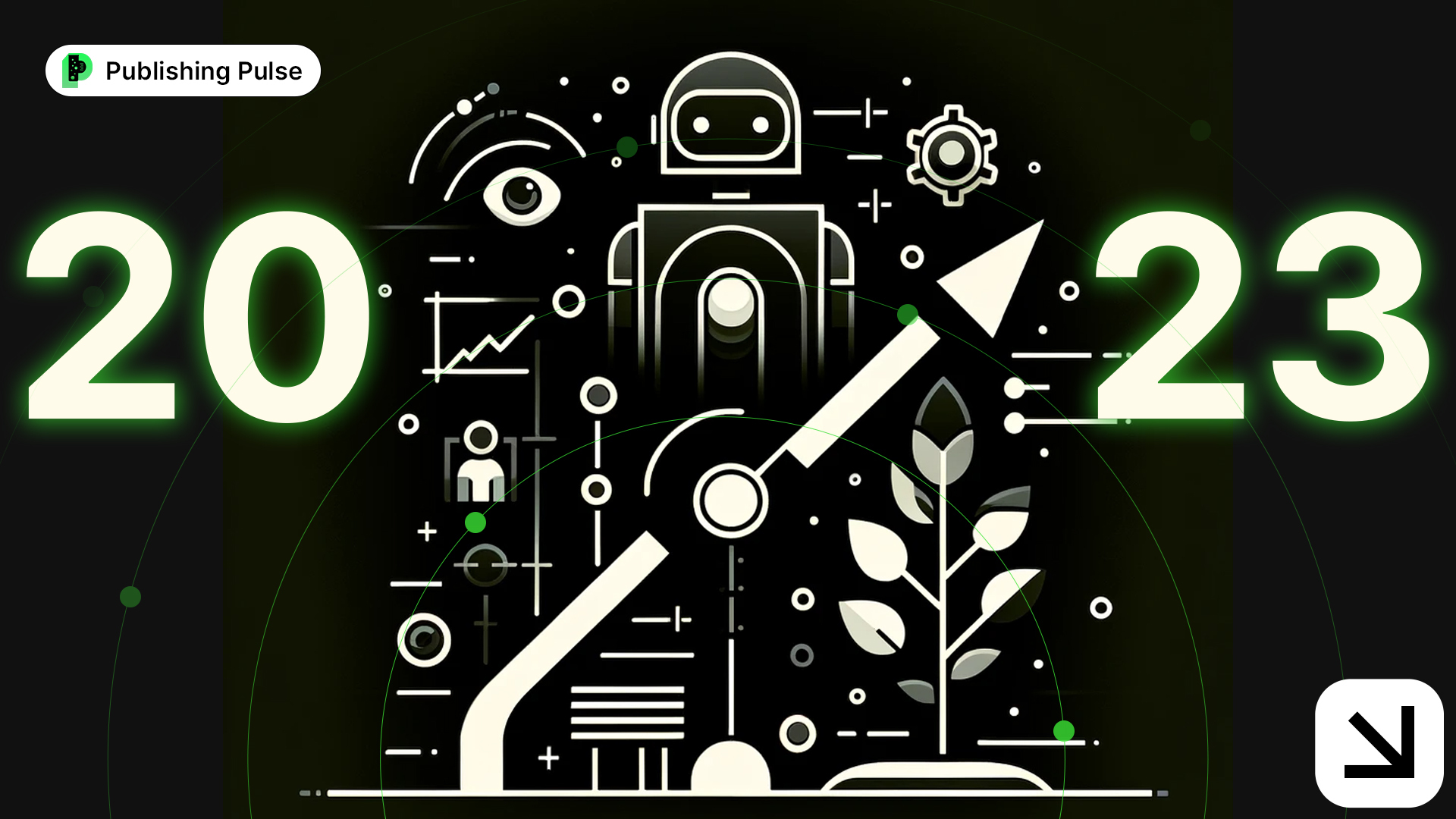
A Milestone Year for Generative AI, Google Changes, and User Dynamics: Publishing Pulse

Get helpful updates in your inbox
Welcome to Publishing Pulse, your weekly source for industry updates in online publishing. Stay informed about the latest trends and breakthroughs in the ad ecosystem, content creation, SEO, AI technology, and monetization.
If you prefer to listen to industry news, you can tune in to The Publisher Lab podcast. New episodes are released weekly on Thursday.
Embracing the Future of Digital Publishing: A Conversation with Ezoic CEO, Dwayne Lafleur
In this week’s special episode of The Publisher Lab podcast, host Tyler Bishop speaks to special guest Dwayne Lafleur, CEO of Ezoic, to recap 2023 and discuss the future of digital publishing. They delve into the role of AI chatbots, the shift in user behavior, and the power dynamics between platforms and publishers. They also touch on the issue of transparency in digital advertising and the potential impact of generative AI on the industry. Dwayne provides practical advice for publishers to navigate the changing landscape, encouraging them to embrace new tools like AI to enhance their work efficiency and stay competitive.
This article will cover the latest news stories in some of the most prominent themes of 2023, if you’d prefer to listen to these news updates in conversation with Tyler and Dwayne, listen to full episode of The Publisher Lab podcast here.

Grok: X’s New ChatGPT Competitor
Elon Musk’s AI venture, xAI, has unveiled its ChatGPT competitor, Grok, now available on X (formerly known as Twitter). Targeted at X Premium Plus subscribers in the United States, the launch prioritizes long-term subscribers and is set to be fully deployed within a week. Grok integrates directly into X’s platform, accessible via the side menu on web and mobile interfaces, and can be added to the bottom menu of X’s mobile applications for enhanced user convenience.
Grok stands out in the crowded AI chatbot space with its unique feature of tapping into real-time data from X posts, a capability that distinguishes it from counterparts like ChatGPT and Google’s Bard. This real-time data access equips Grok with the ability to provide more current and contextually relevant responses.
The technology behind Grok, known as Grok-1, is a generative model trained on web data up until the third quarter of 2023, complemented by human assistant feedback. This extensive training, coupled with its integration into X, positions Grok as a significant player in the evolving landscape of conversational AI.
Google Updates Video Mode to Prioritize Pages with Primary Video Content
Google has recently made a significant update to its search functionality, focusing on how video content is displayed in search results. This update is designed to ensure that video thumbnails appear only when a video is the primary focus of a webpage. This change is particularly evident in Google’s Video mode search results, where the aim is to streamline user access to pages predominantly centered around video content.
This update marks a shift in how Google categorizes and presents video-related content. Pages where videos are considered supplementary, such as blog posts or product pages with videos that complement the text, will no longer feature prominent video thumbnails in search results. This refinement in search results presentation is also mirrored in Google’s Search Console video indexing report. Videos that are not the main content of a page will now be marked as “No video indexed.” Furthermore, Google has introduced a new categorization, “Video is not the main content of the page,” which consolidates and replaces several previous indexing issues.
“Google Search is going to be here for the foreseeable future, but it’s all driven by user behavior. So they either are going to follow that user behavior, and they ultimately have to go and win in a new space,” says Dwayne on The Publisher Lab.
Google Offers Advertisers Limited Ad Placement Data
In response to the Adalytics report, Google has recently made a concession to advertisers by providing limited insights into their ad placements within its Search Partner Network. This move allows advertisers to verify if their ads appeared on approximately 30 problematic sites highlighted in the report. However, the information offered by Google is not comprehensive and lacks detail about the full scope of ad placements.
This new level of transparency, though limited, is a response to advertisers’ increasing demands for clearer insights into where their ads are being displayed. Advertisers can obtain this data through their account teams, but there are limitations, including possibly only accessing data from the past six weeks. This development indicates a shift towards greater transparency in advertising placements, albeit a cautious one, as advertisers continue to seek more detailed and expansive information from Google.
Google AI Search Update Threatens Publisher Traffic
Google’s ongoing integration of AI into its search engine is increasingly seen as a threat to the web traffic and revenue of publishers. For example, the Atlantic magazine, which receives about 40% of its web traffic from Google searches, is apprehensive about AI-powered search engines providing direct answers to users’ queries. This approach could significantly reduce the need for users to visit publishers’ websites, potentially cutting off a major source of their traffic.
This concern is widespread in the media industry, where Google is a crucial source of referrals, accounting for nearly 40% of publishers’ traffic. The potential impact is stark, with publishers estimating a loss of 20% to 40% of their Google-derived traffic if AI-powered search tools like the “Search Generative Experience” — currently being tested on about 10 million users — become a standard feature of Google’s search engine. This development could profoundly reshape the digital landscape for publishers who rely heavily on search engine referrals.
Dwayne comments, “I think there’s two sides, both of which are scary. One is that chatbots morph into replace search, and then there’s the side of AI producing content. I think again, the change on both of those fronts will be slow. Most people are not replacing their search activity with chatbots today. But I do think that that will be like the transition to the phones or the internet, where over the next several years it’s, you know, it’s going to be 1% of people in 2024, it’s going to be 5% of people. In 2025, it’s going to be 20% of people in 2026.”
Bing Adds Deep Search AI Feature
Microsoft has unveiled Deep Search, a new generative AI feature integrated into Bing, specifically aimed at handling complex search queries without clear-cut answers. Utilizing GPT-4, Deep Search enhances Bing’s existing web index and ranking system by accurately interpreting the underlying intent of a query. This allows it to provide a more exhaustive set of results, delving beyond typical search parameters to pinpoint relevant terms and bring forward results that might otherwise remain hidden in standard searches.
Efforts To Expand AI Accessibility
In the world of artificial intelligence, there’s a growing movement towards creating smaller, more cost-effective AI models, aimed at expanding accessibility for a wider range of users and applications. Recognizing that the current large language models (LLMs) with over 100 billion parameters are resource-heavy and impractical for many in the AI research community, there’s an active shift towards developing smaller models specialized for specific tasks. This includes approaches like knowledge distillation, where a smaller dataset is trained, potentially making advanced AI capabilities more widely available and practical for various research and application needs.

Sarah is a social media expert and successful brand marketer. She has experience growing brands and content across multiple different platforms and is always on the cutting edge of emerging social platform and internet culture trends.
Featured Content
Checkout this popular and trending content

Ranking In Universal Search Results: Video Is The Secret
See how Flickify can become the ultimate SEO hack for sites missing out on rankings because of a lack of video.
Announcement

Ezoic Edge: The Fastest Way To Load Pages. Period.
Ezoic announces an industry-first edge content delivery network for websites and creators; bringing the fastest pages on the web to Ezoic publishers.
Launch

Ezoic Unveils New Enterprise Program: Empowering Creators to Scale and Succeed
Ezoic recently announced a higher level designed for publishers that have reached that ultimate stage of growth. See what it means for Ezoic users.
Announcement
